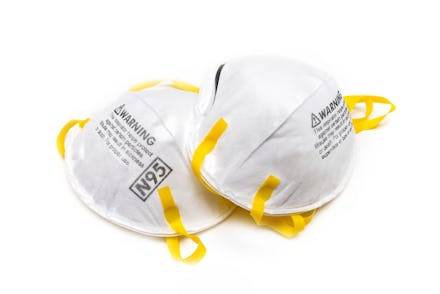The VA awarded a $34 million contract for N95 masks to a company with no relevant expertise

The bizarre, unregulated world of black-market N95 mask sales was illuminated just a bit by ProPublica on Monday. The outlet published a gripping account of a businessman who received a contract from the Department of Veterans Affairs worth tens of millions of dollars, and per the report — which begins with would-be mask dealer Robert Stewart Jr. telling the reporter J. David McSwane, “I’m talking with you against the advice of my attorney” — government agencies like the VA have been signing contracts with unvetted businessmen for masks at wildly inflated prices. Stewart signed a contract to deliver 6 million N95 respirators to the VA for $34.5 million, which would entail a 350% markup over the manufacturer’s price. But per ProPublica’s account, he failed to deliver even a single mask.
McSwane details a bizarre 36-hour whirlwind, in which Stewart invites him on a private jet flight to pick up a shipment of masks, only to find out in mid-air that the masks aren’t at the destination — and may not have been real in the first place. Ultimately, the deal fell through, and the VA is now investigating how the contract was awarded to begin with. No masks have been delivered by Stewart, and meanwhile more than 2,200 VA employees have tested positive for COVID-19.
McSwane initially reached out to Stewart after his research indicated that the massive deal was the first one Stewart’s company had made, and that it had not been subject to a bidding process. He’s just one of many contractors who have reportedly been on the receiving end of a torrent of virus-related federal spending in recent months; $5.1 billion in no-bid contracts have been awarded, per McSwane’s reporting. The contract given to Stewart, who’s only 34, and whose company had no experience with obtaining medical equipment, raises serious doubts about whether that money is being well spent, or whether shady middlemen and inexperienced contractors are fleecing taxpayer money from the government. Even Stewart was surprised at his own success. “Awarding a $34.5 million contract to a small company without any supply chain experience,” he said to McSwane. “Why would you do that?”
“The story is that we started out trying to do the best thing for the country,” Stewart said. “I failed in that, ultimately.”
Stewart met McSwane at the airport, where they boarded a private jet that Stewart paid $22,000 for. He told the reporter that his motives for arranging the deal were altruistic. “We are about to help 6 million people — well, 6 million masks,” he explained. On board the aircraft, though, he told McSwane that those masks were gone, sold to another bidder who’d paid sooner. With only 24 hours left to meet his deadline, he arranged a new order through a former Alabama attorney general named Troy King, whom Stewart claimed had connections to Vice President Mike Pence’s coronavirus task force. King had told Stewart that he had connections with a distributor who, in turn, could acquire the masks from the manufacturer 3M, Stewart claimed. He showed McSwane a shaky “proof of life” cell phone video that King sent him, of masks sitting in a warehouse.
Ultimately, even these masks proved impossible to locate. After hours spent working the phones in the lobby of a Chicago hotel, Stewart gave up trying to get his hands on King’s supposed trove of masks. “I’ve done everything I can do,” Stewart said. “I called in every favor I had.” He cut ties with King and told McSwane that he believed the former AG had made up the supposed connection to Pence’s task force. Now, Stewart is facing an investigation by the VA’s inspector general — a probe that was spurred by McSwane’s article. The wannabe mask supplier claims that he’s not a scammer, but rather a veteran who just wanted to help. “The story is that we started out trying to do the best thing for the country,” Stewart said. “I failed in that, ultimately.”
As for the VA, McSwane asked the department’s spokesperson Christina Noel why the organization needs to use middlemen like Stewart to acquire equipment, as opposed to buying masks directly. The spokesperson explained that FEMA is in charge of mask acquisition for the government; the agency has placed an order for 166 million masks directly with 3M, “some of which are being provided to the VA,” Noel told ProPublica. In the meantime, the VA supplementing its stock of masks through “other vendors,” Noel said.